
Ayurveda


Basically, Ayurveda is a herbal medicine system and it cures many incurable diseases. These herbal products are used in the form of powder, decoction, tonic, etc. These could be a single herb or a mixture of many herbal products, depending on the diseases and the treatment required.
Ayurveda
Ayurveda, a natural system of medicine, originated in India more than 3,000 years ago. The term Ayurveda is derived from the Sanskrit words ayur (life) and veda (science or knowledge). Thus, Ayurveda translates to knowledge of life. Basically, Ayurveda is a herbal medicine system and it cures many incurable diseases. These herbal products are used in the form of powder, decoction, tonic, etc. These could be a single herb or a mixture of many herbal products, depending on the diseases and the treatment required. The use of herbal products for treatment in India dates back to prehistoric times. In the Indus Valley Civilization tree worship was a very remarkable feature, which shows the importance of plants and plant products in human life. In Vedic times, Rigveda mentions a few plants like Semal, Pithvam, Palash, Pipal, etc. These references increased in the later works, like Atharvaveda. The Kalpasutra of Atharvaveda refers to an exhaustive list of 579 plants and mentions their botanical characteristics and medical properties


Benefits of Ayurveda
Health Benefits of Ayurveda is the Toxins in the Body are Reduced. You Learn to Clear Up Energy. Better Health at a Cellular Level. Stronger Digestion. Ayurvedic medicine has been used for centuries in India, where it originated. It is now gaining traction around the world. While it may not be able to cure chronic conditions that have progressed into later stages, this practice of medicine can prevent early-stage chronic conditions from progressing. Ayurveda, the traditional medical system of India, has delineated three categories of fundamental regulatory principles of the body, mind, and behavior. These three categories, called doshas, are named Vata, Pitta, and Kapha.


